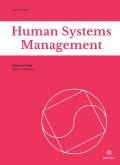Authors: Liang, Thow Yick
Article Type:
Research Article
Abstract:
As humankind ventures deeper into the intelligence era, a totally re-defined mindset is essential to ensure its continuity. With the emerging new environment, human organizations must behave as intelligent beings, in the same manner as biological entities are competing for survival in an ecological system. They must learn, self-organize, adapt, compete and evolve. Thus, human systems can no longer be like machine. Consequently, the structures and characteristics of the industrial era will have to be dismantled. This shift in paradigm requires all human organizations to re-design their structure and operations around intelligence. Therefore, to strategize for the future, the
…first initiative human organizations need to adopt is to establish an intelligent structure, and to nurture an orgmind and its collective intelligence. A significant component of the orgmind is an intelligence enhancer comprising three entities, namely, intelligence, knowledge structure and theory. These entities interact continuously among themselves, supported by at least one physical symbol system. Eventually, the accuracy and appropriateness of the language used helps to enhance the engagement of the interacting agents in organization. In this respect, the ability to learn continuously, to adapt quickly, and to evolve effectively, is sustained by the intelligence enhancer.
Show more
Keywords: Intelligent organization, orgmind, collective intelligence, complexity, nonlinearity, intelligence enhancer, theory, knowledge structure, intelligence strategy
DOI: 10.3233/HSM-2002-21102
Citation: Human Systems Management,
vol. 21, no. 1, pp. 9-19, 2002
Price: EUR 27.50





